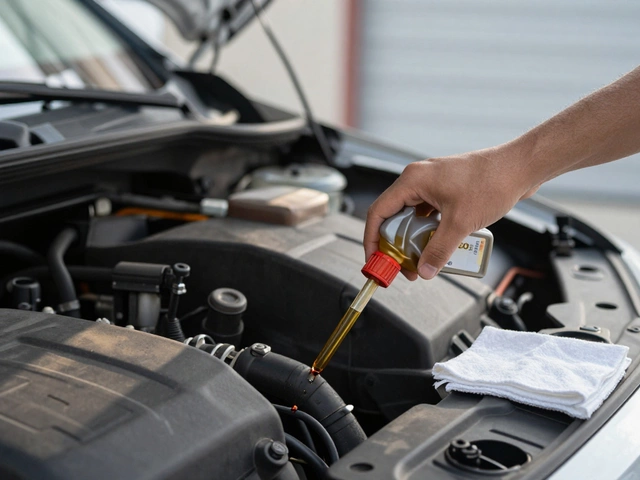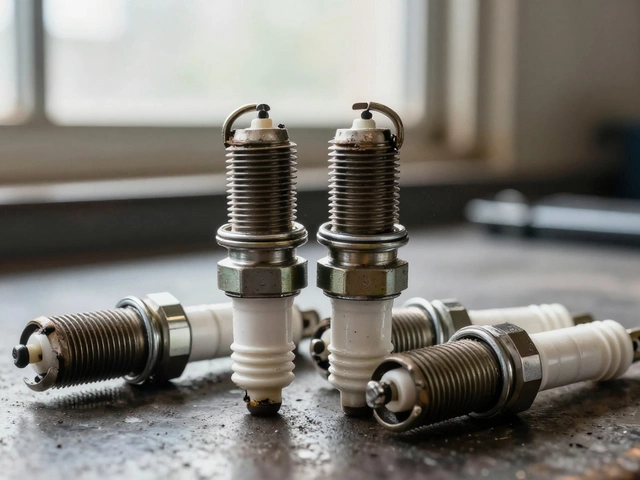
Ever wondered if those little spark plugs play a big part in your car's exhaust system? Turns out they do more than just help your engine start. Spark plugs ignite the fuel-air mixture in the engine's cylinders, and that tiny spark is essential for combustion. When this process isn't ideal, it can lead to incomplete fuel burn. You know what that means, right? Yep, your car's not running as efficiently, and it might even be spewing more nasties into the air.
So, what's the deal with spark plugs messing with the exhaust? When they're worn or dirty, they can cause misfires or a rough idle, making your exhaust system work overtime. And if left unchecked, this can lead to more serious engine troubles. Paying attention to your spark plugs can actually boost your car's performance and reduce those pesky emissions.
- The Basics of Spark Plugs
- How Spark Plugs Affect Exhaust
- Signs of Worn-Out Spark Plugs
- Maintaining Spark Plugs
- Choosing the Right Spark Plugs for Your Car
The Basics of Spark Plugs
Spark plugs are pretty much the unsung heroes of your car’s engine system. They might be small, but boy, do they pack a punch! These little devices are responsible for creating that all-important spark needed to ignite your car's fuel and air mixture. Without this spark, you're not going anywhere fast–literally. The spark plug plays a crucial role in the ignition process, which is why it has such a big impact on exhaust.
Each spark plug is like a tiny electrical bridge. When your car's ignition coil sends voltage to a spark plug, it jumps across a small gap on the plug’s tip, starting the combustion sequence. This initiation of combustion keeps your engine’s pistons pumping, which in turn makes your car move. With poor-quality or worn-out spark plugs, your engine will falter, efficiency drops, and emissions rise.
According to an expert from the University of Michigan Automotive Research Center, "A healthy spark plug ensures the engine’s combustion process is efficient, minimizing emissions and maximizing power."
The typical spark plug has a lifespan anywhere from 20,000 to 100,000 miles, depending on the type of material used—be it copper, iridium, or platinum. Iridium and platinum spark plugs tend to last longer than copper plugs due to their durability and efficiency.
| Type of Spark Plug | Average Lifespan |
|---|---|
| Copper | 20,000 miles |
| Platinum | 60,000 miles |
| Iridium | 100,000 miles |
Keeping your engine running smoothly isn't just about avoiding a breakdown. Spark plugs affect the mixture burning in each cylinder, and that directly impacts exhaust system efficiency. Proper maintenance can help keep emissions low and your vehicle’s engine performance optimal.
So next time you rev your engine, maybe give a nod to those spark plugs under the hood—keeping your ride smooth and the exhaust clean takes a team effort!
How Spark Plugs Affect Exhaust
You might not think about it often, but spark plugs are tiny heroes in your engine's big adventure. They play a significant role in how efficiently your car's exhaust system operates. Here's the thing: when spark plugs are doing their thing right, the combustion process in your engine is smooth as butter. But if they're not up to snuff, things can go a bit haywire.
First off, worn-out spark plugs can cause misfires. This happens because these little guys fail to ignite the fuel-air mixture properly. Imagine you're trying to light a campfire with half-burnt matches. The result? More fuel ends up in the exhaust, and your car chugs out more emissions.
Misfires can also lead to increased emissions of harmful gases like carbon monoxide and hydrocarbons. Not great for the environment or your health, right? But it doesn't stop at pollution. Inefficient combustion can hurt your fuel efficiency too. A drop in performance means you're stopping at the pump more often, and that's no fun for your wallet.
Sometimes, faulty spark plugs mean your engine has to work harder to keep up with the demand, possibly straining other components. This increased workload can make your exhaust system hotter, putting more wear and tear on it. That's why, along with checking the oil and tires, keeping an eye on those spark plugs is a must.
Let's also touch on the sound of things. A properly working spark plug keeps your engine noise to a minimum. If your car's starting to announce its arrival with clunks and rattles, suspect those plugs first.
To wrap up this bit, remember that healthy spark plugs mean a healthy exhaust. So, next time you tune-up your ride, give some love to these essential engine components. It's a small step that keeps smoke signals and bills down.

Signs of Worn-Out Spark Plugs
Spotting the signs of worn-out spark plugs is crucial for keeping your car running smoothly. Ignoring these signs can lead to bigger problems, so let’s dive into the tell-tale signs you should watch for.
One of the first giveaways of faulty spark plugs is a rough idle. You know what I mean – when your car's parked, and it starts shaking like it’s got a bad case of the chills. Another dead giveaway is engine misfires. If your car suddenly jerks or loses power, that's a clear sign something's amiss.
Have you noticed your fuel mileage dropping? When spark plugs aren't firing efficiently, your engine needs more fuel to get the job done. So, if your trips to the pump are becoming more frequent, those spark plugs might be to blame. Keep an eye on your dashboard lights too. An illuminated check engine light can signal spark plug trouble. This one shouldn't be ignored, as it often points to underlying issues that could worsen.
Another symptom to be wary of is difficulty starting your car. If turning the key feels like more of a workout than usual, bad spark plugs could be causing the delay. The spark isn't strong enough to ignite the fuel-air mixture, making the engine sluggish on startup.
- Rough Idling: Shaking or vibrations when the car is idling.
- Engine Misfires: Sudden jerks or loss of power.
- Poor Fuel Efficiency: Increased trips to refuel your vehicle.
- Check Engine Light: An illuminated light on the dashboard.
- Difficulty Starting: Trouble or delay when turning the ignition.
By keeping an eye out for these signs and addressing them early, you can keep your car's engine performance and fuel efficiency in top shape. Don’t wait until you’re stranded on the side of the road. Stay ahead of the game by replacing those spark plugs when you notice these warning signs.
Maintaining Spark Plugs
Keeping your spark plugs in tip-top shape is crucial for your car's smooth operation. It might sound like a hassle, but it's relatively straightforward and can save you a ton of trouble down the road. These nifty little parts need regular attention to ensure your engine runs smoothly and keeps emissions in check.
First things first, you should check your car's manual to know how often to replace those plugs. An average rule of thumb is every 30,000 miles, but some last longer. You'll know they're due for a change if you're experiencing hard starts, misfires, or a decrease in fuel efficiency.
Wondering how to maintain them? Here's a simple checklist:
- Regularly inspect for wear and tear or build-up, which can cause misfires.
- Use a spark plug gap tool to check and adjust the gap between the electrode and the catalyst.
- Always clean off any debris or oil before checking them to ensure an accurate reading.
- If you're replacing them, make sure you buy the right type for your engine. Too hot or too cold, and they won’t last.
- When installing new ones, screw them in by hand first to avoid damaging the threads, then tighten them lightly with a torque wrench.
How do good spark plugs affect your exhaust? Proper maintenance helps reduce emissions and improves fuel efficiency. Clean plugs mean a more complete burn of the fuel-air mixture, which means fewer unburnt fuel particles escaping through your exhaust.
Here's a quick look at some factors involved:
| Condition | Impact on Performance |
|---|---|
| Clean and Properly Gapped | Optimized combustion, efficient fuel use, reduced emissions |
| Worn Out or Dirty | Misfires, higher emissions, reduced efficiency |
Keeping those spark plugs fresh isn’t just about extending their life; it’s about keeping your whole exhaust system happy too. Regular attention to these small but mighty parts pays off big time in the long run.

Choosing the Right Spark Plugs for Your Car
Picking the right spark plugs can feel a bit like choosing the perfect coffee blend. You want the one that makes everything run smoothly. But with so many options out there, how do you know which one to grab? Let's make it simple.
First up, always check your car's manual. The manufacturer usually knows what's best, listing the exact type and specification needed for optimal engine performance. If that dusty manual is long gone, a quick search online for your car model should do the trick.
Next, think about the type of metal used in the spark plug. You've got copper, platinum, and iridium. Copper is the old reliable, offering good performance but usually needing replacement a bit sooner. Platinum and iridium plugs last longer and handle heat better, making them great for modern engines.
Consider the heat range too. This number tells you what temps the plug can operate efficiently at. If you’re driving in colder climates, you might need a hotter plug, while hotter zones might call for a cooler one.
Keep in mind that the right plugs can boost not just your fuel efficiency but also help the exhaust system work at its best. You don’t want anything slowing your ride down, right?
- Copper Spark Plugs: Economical, suitable for older vehicles
- Platinum Spark Plugs: Lasts longer, provides better fuel efficiency
- Iridium Spark Plugs: Top-notch longevity and performance, great for newer cars
A little planning while picking those tiny but mighty components can lead to smoother rides, with better emissions, and fewer trips to the mechanic. Now, doesn't that sound worth it?





